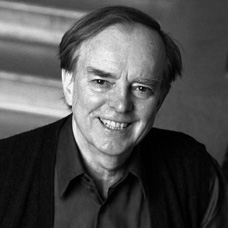Lleonard Balada
Contemporary music
(Lleonard Balada, Barcelona 1933)
Composer and pedagogue, he studied at the Conservatori del Liceu and the Juilliard School in New York. He has been living in the USA since 1956 and he has been Professor of Composition at the Carnegie Mellon University in Pittsburgh since 1970. Influenced in his youth by the artwork of his friend Salvador Dalí, he studied composing with Aaron Copland and is now one of the pioneers in combining folkloric ideas with avant-garde techniques. Faithful to his style, eclectic when combining different techniques and highly gifted in his art of orchestrating, he holds a very extensive symphony and opera catalogue, recorded by Naxos over the last several years.
His orchestral art began to shine in pieces of great dramatic tension, like in Guernica (1966), inspired by the famous Picasso painting and which was premiered by the New Orleans Philharmonic and conducted by W. Torkanowsky. Another example is the multi-rhythmic Steel Symphony (1972), a deep poetic and dramatic meditation, premiered by the Pittsburgh Symphony Orchestra and conducted by Donald Johannos, and later recorded by Lorin Maazel. He has consolidated a very personal style, which earned its own tonal identity starting from Sinfonía en Negro (Homenaje a Martin Luther King, 1968) and his homages A Pau Casals and A Pablo Sarasate, both from 1975.
Over the years he has been wonderfully expanding his symphonic catalogue with pieces such as Sardana (1979), a free and colourful version of the national dance of Catalonia and Quasi un pasodoble (1981), a musical fantasy based on the Spanish pasodoble. Folk Dreams (1998), a suite based on folkloric melodies from Latvia, Catalonia and Ireland, premiered by the Ireland National Symphony Orchestra and conducted by Colman Pearce. There are also the symphonies núm. 4, «Lausanne» (1992), núm. 5, «Americana» (2003) and núm. 6, «De les Penes» (2006), dedicated to the Spanish Civil War’s innocent victims, commissioned by the Orquestra Simfònica de Barcelona and the Nacional de Catalunya (OBC), premiered in February 2006 and conducted by Salvador Mas. And lastly there is the intriguing Prague Sinfonietta, a unique encounter between the Mozart-like spirit and the melodic charm of the sardana dance, commissioned and premiered by the Festival Internacional de Músiques de Torroella de Montgrí (Catalunya) in 2005.
Balada’s many concerts include: the Concert per a 4 guitarres i orquestra (1976), commissioned by the former Orquestra Ciutat de Barcelona, premiered by the Tarragó Quartet, and conducted by Antoni Ros Marbà; Persistencias. Sinfonía concertante para guitarra y orquesta (1978), commissioned and premiered by Narciso Yepes, with the Orquesta Nacional de España, and conducted by Jesús López Cobos; the exuberant and freely inspired by the music of Andalusian gypsies Concierto mágico, para guitarra y orquesta (1997), also premiered by López Cobos, with the Cincinnati Symphony and Ángel Romero as a soloist; the Concert per a piano i orquestra núm. 3 (1999-2000), a virtuoso piece that explores the sounds of the Spanish dances such as the pasodoble and the jota, premiered by Rosa Torres-Pardo and the Berlin Radio Symphony Orchestra, with Rafael Frühbeck de Burgos as the conductor; the jazzy Concert per a violoncel i orquestra núm. 2, «New Orleans» (2001), premiered by the same group and conductor, with Michael Sanderling as a soloist, and the Concert per a tres violoncels i orquestra, «Concert Alemany» (2006), premiered at Berlin’s Philharmonie Hall in October 2007.
As for his experience with chamber music, one can find the series Caprichos, for a soloist instrument and a chamber orchestra, and Una pequeña música nocturna en Harlem (2006), based on Mozart’s piece with a similar name, commissioned by the Budapest Chamber Symphony.
His pieces have been performed by a long list of important orchestras in North America and Europe. This list includes the Philharmonics of New York, Los Angeles, Israel and Mexico City, the Symphonics of Chicago, Dallas, Detroit, Cincinnati, Prague and Düsseldorf, as well as the Philadelphie, the London Philharmonic Orchestra and the national orchestras of Washington and Spain. Not any less important is the list of maestros who have conducted his scores, which includes Mstislav Rostropòvitx, Lorin Maazel, Marin Jansons, Rafael Frühbeck de Burgos, and Jesús López Cobos.
As a composer, Ballada is particularly drawn to the lyrical genre. He is the author of María Sabina (1969), a symphonic tragedy for narrators, mixed choir and orchestra, written in collaboration with the Nobel Prize winner Camilo José Cela. Another symphonic tragedy is No-Res. Un rèquiem agnòstic (1974, revision 1997), for a narrator, mixed choir and orchestra, with the collaboration of the French writer Jean Paris. Lastly, his piece Ebony Fantasies (2003), made for a choir and orchestra, was premiered in February 2004 by the Orquesta y Coro de la Comunidad de Madrid with Lorenzo Ramos as the conductor.
What most stands out in his theatre production is the lyrical trilogy dedicated to the man who discovered America, Cristóbal Colón (1986), an opera of sheer commemorative splendour marking five centuries since the discovery of America, with a libretto by the writer Antonio Gala. It premiered at the Gran Teatre del Liceu de Barcelona in 1989, with the soprano Montserrat Caballé and the tenor Josep Carreras in their main roles. A decade later he wrote a concert version sequel, La muerte de Colón (1996), which premiered in 2005 at the Carnegie Music Hall in Pittsburgh, and more recently, the chamber opera La resurrección de Colón. He has also written the opera Zapata (1984) and the chamber opera Hangman, Hangman! (1982), commissioned and premiered by the Festival Internacional de Música de Barcelona that same year, and its sequel, The Town of Greed (1997), both with a libretto of the composer, a splendid orchestration and a lyrical cantabile in its voices. These two operas were brought to stage in October 2007 at the Teatro de la Zarzuela de Madrid, with stage direction by Gustavo Tambascio, which was also performed at the Foyer del Gran Teatre del Liceu in November of that same year, with Álvaro Albiach as the musical director. This was part of a joint initiative between the Barcelona lyrical center, the Festival d’Òpera de Butxaca i Noves Creacions and the Fundació Caixa Catalunya, seeking to promote the biannual premiere of new chamber operas on this stage.
On February 13, 2009, Balada enhanced his lyrical catalogue even more with a new ambitious opera, Faust-Bal (2007), commissioned by the Teatro Real de Madrid. With the playwright Fernando Arrabal’s libretto, the piece is a surrealist 21st century interpretation of the classic Faust tale. Its entire premiere was conducted by Jesús López Cobos and elaborated on stage by Joan Font, head of the theatre group Comediants.
In January 2012, the Orquesta Filarmónica de Málaga dedicated to him its 18th Season of Contemporary Music. That same year he also worked on the composition of a new cantata with the words based on the speech that the historical leader of the Spanish Communist Party, Dolores Ibárruri La Pasionaria (Biscaia, 1895-Madrid, 1989), gave in their goodbye to the International Brigades in Barcelona in 1938.





 twitter
twitter flickr
flickr facebook
facebook RSS
RSS spotify
spotify youtube
youtube
